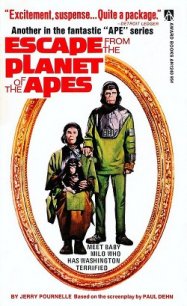Conquest of the Planet of the Apes - Jakes John (читать книги онлайн полностью txt) 📗
“—would suggest that the ape leader may be the child, thought to have been destroyed many years ago, of the two talking chimpanzees named Cornelius and Zira, who came to Earth claiming to be from outer space. If this proves true, the ape leader could constitute a threat to the future of the human race. Further background is coming on a report—” The announcer glanced sideways again. “Oh, we have that report ready now. Stay tuned as we switch to Network News Analysis for videotapes of—”
Jason Breck’s fisted hand hit the television control. The tiny screen blacked out. He whirled, shoved an assistant out of the way, stormed to the rail of the terrace overlooking the plaza. Deserted now. The pavement reflected the glow of distant lights left burning to afford visibility to the police snipers who would be taking up positions on similar terraces and parapets above the main public areas in the central city, as well as along major thoroughfares. Out in the empty boulevards, Breck detected the growl of engines; police and fire vehicles preparing for the coming onslaught.
An assistant interrupted the governor’s concentration. “Sir—” He whirled. “Command Post says the ape force is approaching the city limits near Alpha Boulevard.”
“Open the cordon. Let them through. Then close the cordon—and order all units into immediate action. We can kill them easier on the streets than in the suburbs.”
Over the shoulder of the retreating assistant, he spied MacDonald’s grave face again. Malice twisted the governor’s mouth.
“Mr. MacDonald, you’re privileged to be a witness to something absolutely unprecedented on this planet. Pitched battle between human beings and animals. Do you still think I am unduly suspicious? An alarmist? Mr. MacDonald—?”
The black man had turned away.
Allowing himself a humorless smile, Breck returned to the terrace. He stiffened at a new sound.
Apes.
Grunting, chittering—somewhere down in a dark street that ran off the right-hand side of the plaza.
His scalp crawled.
The sound seemed to intensify, more sibilant, more urgent. Distantly, gunfire crackled.
Kill them, he thought. Kill every last one of them.
He didn’t like that restless stirring in the dark at the edge of the plaza; he didn’t like the idea of apes abroad in this part of the city. No animals from the rioting band could have penetrated this far already . . .
“I’ve changed my mind. I’m not sure it’s safe to watch from here. Tell the Command Post we’re coming back. We’ll use the underground tunnel.”
SIXTEEN
The boulevard stretched away black and empty into the distance. Many lights had been extinguished. All first floor offices and shops had likewise been darkened. Under the looming wall of a high rise, Caesar led the van of his little army, halting at each corner to look both ways before signaling the cross.
The apes were intimidated by the silence; by the dark, empty ways between the towering buildings. On the march, Caesar had passed the word that he had signaled for city-wide rebellion, but the apes following him saw no indication of it. Unless there were some sign of the rebellion to encourage them, some spark to ignite their momentarily forgotten hatred, Caesar knew his ape army might turn and scatter. The immense gamble might come to noth . . .
An explosion and spurt of fire from high on the right shattered the pavement inches from Caesar’s left foot. Police sniper! his mind screamed as he dove for the pavement, crawled wildly ahead. The rifle exploded twice more . . .
He had not acted solely from self-preservation. If he were killed, the leaderless apes would surely be slaughtered. So he let the hammering rifle expend its loads on animals who had been only a few steps behind him. Backed against a wall out of the line of fire, he saw six apes down, dead or dying.
The reverberations faded away. Several apes bent to touch their fallen comrades. The rifle crashed again. A gorilla pitched over. With a long, howling cry, Caesar ran into the open.
He dashed straight to the opposite side of the street, ending up directly beneath the arched walk where the gunman was hiding. From above, the sniper would have a difficult time aiming at him.
Behind, he heard a blood-cry from many throats. Good. His deliberate sacrifice of the animals shot down had provided the spark to rekindle the fire.
His own howling fanned it—and in a moment, he was once more dashing down the center of the boulevard at the head of his screaming band.
Other snipers blazed away, dropping apes in twos and threes. But the blood lust was running high. The apes did not turn back.
Caesar took an erratic, zig-zag path, his next target clear in his mind . . .
The cordon of men stretched across the boulevard in the distance.
At the Civic Center, the apes clustered at the head of the street rounded their eyes when they heard the faraway shooting. The explosions were followed by a mounting roar that rippled excitement through the skulking animals. One barked orders. He and two others risked running a dozen yards into the plaza, spilling kerosene from open containers.
The other apes cleared the mouth of the street.
The leader, a large orangutan, used a lighter from his uniform pocket to ignite a soaked rag. He tossed the rag on the kerosene trail. It lit with a roar, flamed all the way back into the street, kept burning till it reached the mouth of the washroom passage—blowing the kerosene stockpile with a thunderous puffball of heat and fire.
Windows shattered along both sides of the street. The pillar of fire leaped high. The orangutan racing across the plaza waved jubilantly to animals cowering nearby. He pointed to a similar burst of fire visible down another thoroughfare.
The signal had been given. The revolt had begun.
An unstoppable tide of hairy brute power, Caesar and his band crashed against the linked arms of the helmeted policemen lined across the boulevard. Rifles blasted from nearby terraces. Apes fell. But so did policemen.
Caesar was constantly moving forward, dodging and twisting, kicking and gouging. The apes shattered the police line, then charged the second rank—firemen backed against their huge chromed vehicles.
A fireman clumsily tried to aim an unfamiliar gun at Caesar’s chest. The chimpanzee dove into the man at waist level, knocking him back against a fender, wrenched the pistol from the man’s hand and blew his head off.
All around, in brutal hand-to-hand combat, gorillas and chimps and orangutans struck and tore at the ranked defenders—and broke through, rallied by the sight of Caesar leaping to the top of one of the fire vehicles, brandishing his pistol as he pointed the way to the inner city. An instant after he leaped down on the other side, a sniper’s bullet dented the steel cab top where he’d been standing.
Apes poured up and over the barricade of vehicles while humans and animals struck down in the initial melee shrieked and moaned. Caesar forgot about them. To win the city required striking at its heart—the Civic Center. He raced that way, encouraged all at once by the gleam of fire.
“Look!” he cried over his shoulder. “Our brothers—rising to help us!”
The apes pouring over the vehicle barricade began the mass howling again, a blood-cry that thundered between the high rises and all but drowned out the occasional burst of rifle fire.
Caesar’s apes roared into the huge plaza where he had first arrived with Senor Armando.
Halting to draw deep, ragged breaths, Caesar saw other apes streaming into the plaza from the opposite side.
The first link with the city forces established, Caesar permitted his troops a brief foray of looting.



